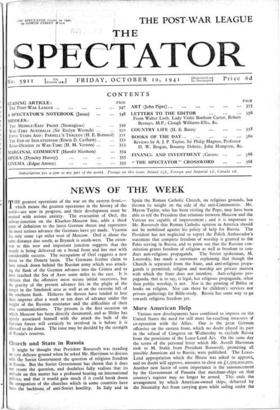Church and State in Russia
It might be thought that President Roosevelt was treading on very delicate ground when he asked Mr. Harriman to discuss With the Soviet Government the question of religious freedom in Russia. But the Soviet Government has shown that it does not resent the question, and doubtless fully realises that its attitude on this matter has a profound bearing on international Politics, and that it would gain much if it could break down the antagonism of the churches which in some countries have been the backbone, of anti-Soviet hostility. In Italy and in Spain the Roman Catholic Church, on religious grounds, has thrown its weight on the side of the anti-Communists. Mr. Myron Taylor, who has been visiting the Pope, may have been able to tell the President that relations between Moscow and the Vatican are capable of improvement ; and it is important to Mr. Roosevelt that Roman Catholic opinion in America should not be mobilised against his policy of help for Russia. The President has not neglected to report the Polish Ambassador's statement that complete freedom of worship is granted to the Poles serving in Russia, and to point out that the Russian con- stitution grants freedom of religion as well as freedom to con- duct anti-religious propaganda. The Soviet spokesman, M. Lozovsky, has made a statement explaining that though the Church is separated from the State, and anti-religious propa- ganda. is permitted, religion and worship are private matters with which the State does not interfere. Anti-religious pro- paganda, that is to say, is legal, but religious propaganda, other than public worship, is not. Nor is the printing of Bibles or books on religion. Nor can there be children's services nor private gatherings for Bible-study. Russia has some way to go towards religious freedom yet.


























